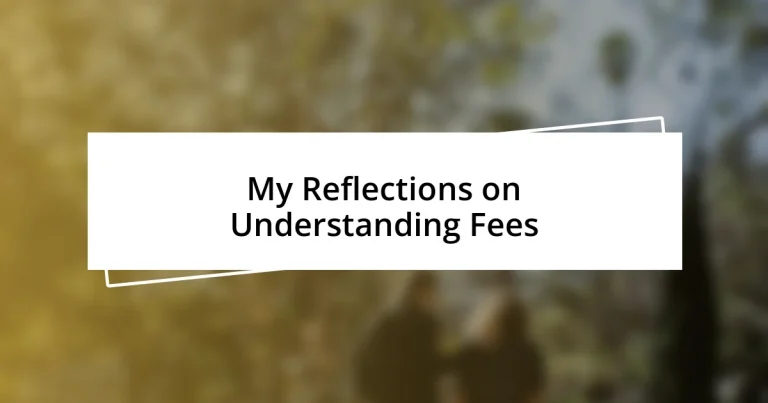Key takeaways:
- Understanding fees requires recognizing their purpose beyond initial perceptions; many fees fund valuable services that could benefit users significantly.
- Effective fee analysis involves thorough research, comparing service providers, and utilizing technology for better financial decisions.
- Regularly reviewing and reflecting on fees can lead to insights, uncover savings opportunities, and enhance overall financial management.
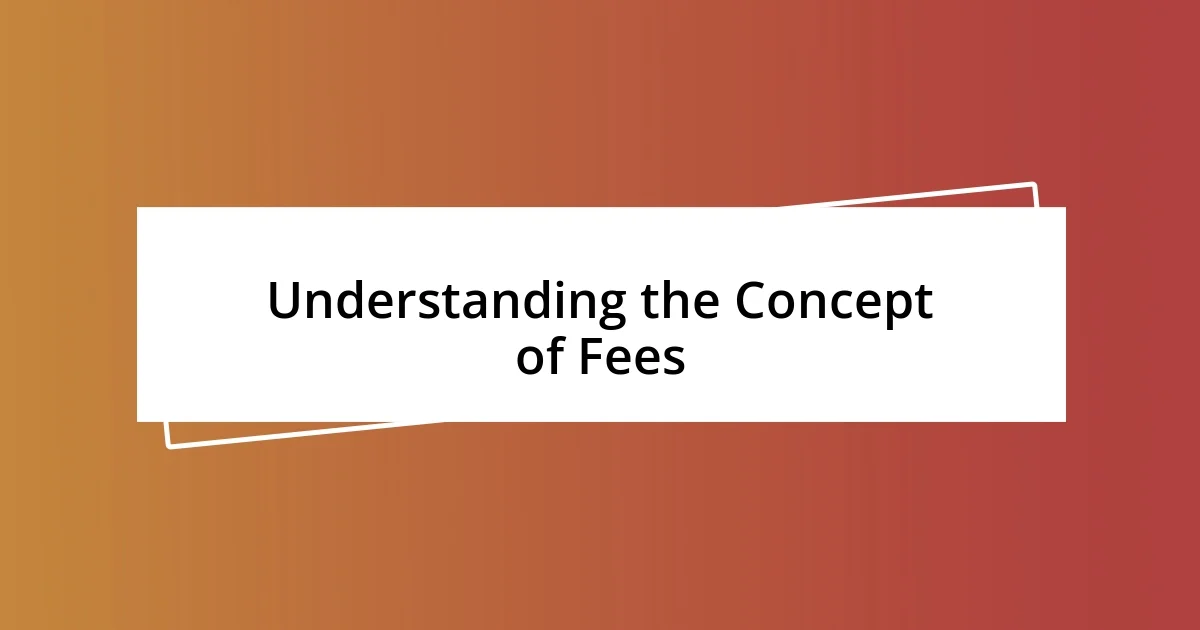
Understanding the Concept of Fees
Fees are an integral part of many transactions, and understanding them can feel overwhelming at times. I remember the first time I encountered a surprising fee while trying to book a flight. It was frustrating to see that the ticket price was significantly higher than advertised due to additional charges. Have you ever felt that shock when examining your bank statement? It’s an eye-opener.
When I dive into the world of fees, I learn that they often serve a purpose. For instance, think about service fees; they can cover costs that aren’t immediately apparent. I once paid a fee thinking it was just an unnecessary expense, but later learned it funded customer support, which proved invaluable during a travel mishap. This led me to question: Are fees truly burdensome, or do they serve deeper value?
Understanding fees requires looking beyond the surface. Many services disclose their fees upfront, yet hidden costs can emerge later. This reminds me of my experience with a subscription service—I initially thought the price was reasonable, but the add-ons crept up on me. It made me realize that when evaluating fees, clarity is vital. Are we really informed about what we’re paying for, or are we left in the dark?
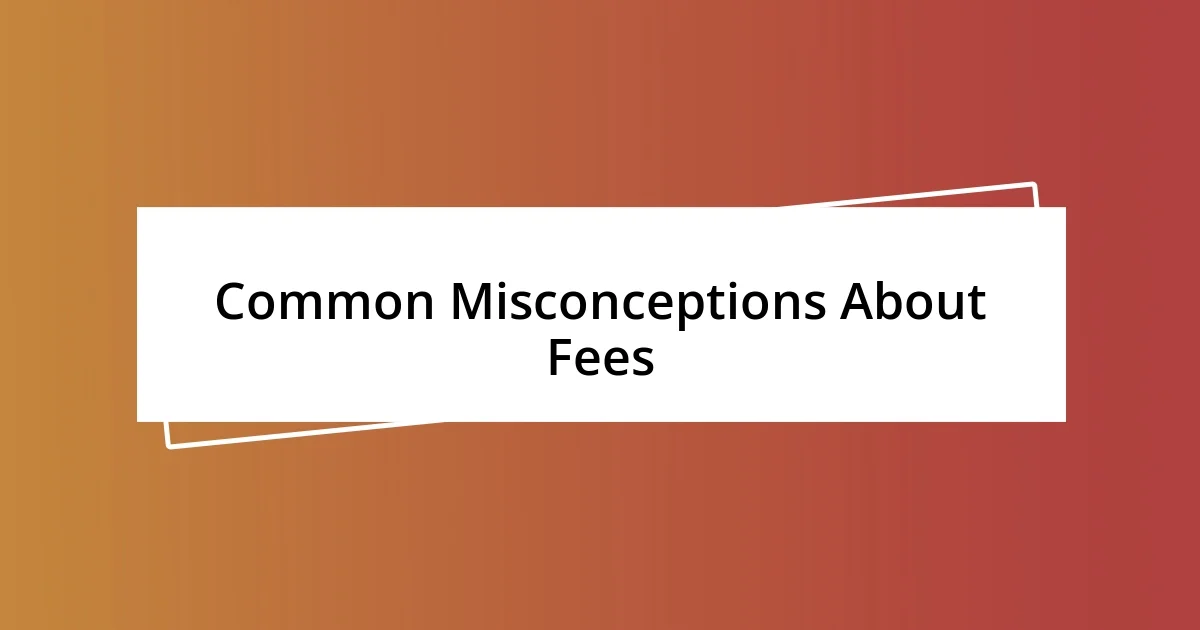
Common Misconceptions About Fees
When thinking about common misconceptions about fees, one that often comes to mind is the belief that all fees are unnecessary money grabs. I used to feel this way when I encountered my first bank fee; I was outraged, assuming they just wanted to take my hard-earned cash. However, as I learned more about banking, I discovered that these fees often cover essential services like account maintenance and fraud protection.
Here are a few misconceptions I’ve come across:
– All fees are hidden: Many fees are clearly stated up front, yet people often overlook them in the fine print.
– Fees are always negotiable: While some fees can be waived or reduced, this isn’t always the case, especially with institutional services.
– Fees don’t serve a purpose: I’ve come to realize that many fees, like those for support services, provide value that can save time and stress in critical situations.
I remember feeling blindsided when receiving a fee for missing a payment. It felt like such a penalty, but later I understood that it helps encourage timely payments, which benefits both the company and customers like me in maintaining an account in good standing. Recognizing these distinctions can shift our perspective on fees from viewing them as mere expenses to understanding their role in a broader context.
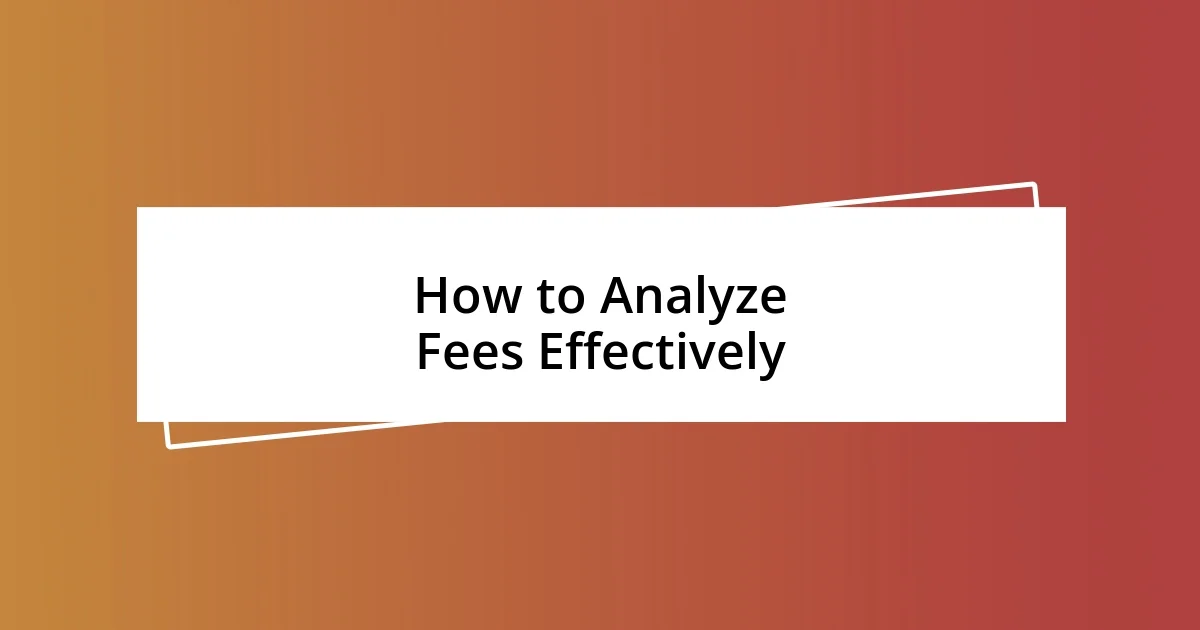
How to Analyze Fees Effectively
To analyze fees effectively, it’s essential to prioritize thorough research. When I first started examining the fees associated with my credit card, I was shocked to discover how varied they could be. By breaking down each type of fee, such as late payment fees or cash advance fees, I gained a clearer understanding of their implications. Have you taken the time to dissect the fees associated with your own accounts?
Identifying the purpose behind each fee can significantly reshape your perspective. I remember feeling relieved when I traced a seemingly arbitrary charge back to an expired promotional offer. This understanding revealed that not all fees are meant to penalize; some are tied to specific terms that we might overlook during the signup process. It’s a reminder that a bit of diligence can illuminate hidden details and save us from unwarranted surprises.
Utilizing comparison tools can streamline your fee analysis. For instance, I once used a budgeting app that allowed me to see a side-by-side comparison of the fees from different banking services. This practical approach helped me decide where to place my funds for maximum value. Are you leveraging technology to dissect and compare fees in your financial decisions?
| Fee Type | Description |
|---|---|
| Service Fees | Cover costs related to providing services, often necessary. |
| Transaction Fees | Charges applied for certain transactions, like withdrawals. |
| Late Payment Fees | Pennies for missed payments, incentivizing timely management. |
| Account Maintenance Fees | Fees for maintaining your account, usually for bank services. |
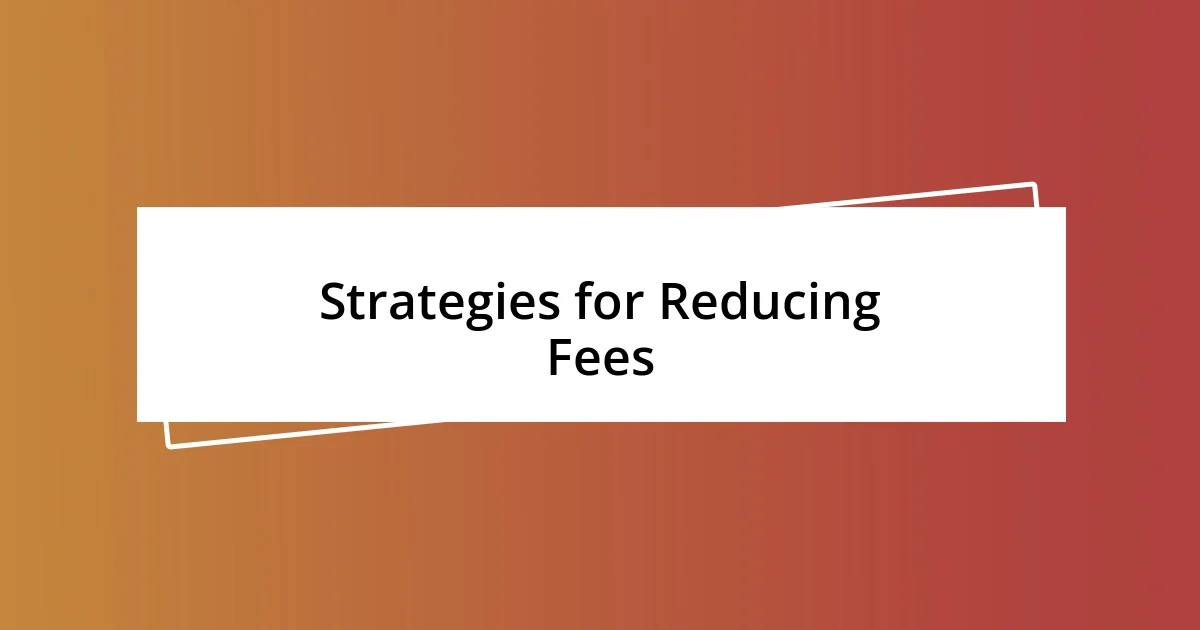
Strategies for Reducing Fees
One effective strategy for reducing fees is to negotiate them directly. I remember when I was faced with an unexpected annual fee on my credit card; instead of accepting it, I called customer service. I was pleasantly surprised when they agreed to waive it after I explained my loyalty to their brand. Have you ever realized that a simple phone call can lead to significant savings?
Another approach is to switch to fee-free or low-fee service providers. During a time when I was tracking my spending, I discovered that my bank charged higher fees than others in my area. After switching, I saved a chunk of change that I could redirect towards more meaningful financial goals. It made me think—how often do we settle for services that don’t align with our budget?
Staying informed about promotional offers can also play a pivotal role in reducing fees. Once, I stumbled upon a limited-time offer from my bank that provided free maintenance for a year if I set up direct deposits. This not only saved me money but also streamlined my finances. Have you checked if your accounts offer similar promotions? Regularly revisiting your financial agreements can yield surprising opportunities to cut costs.
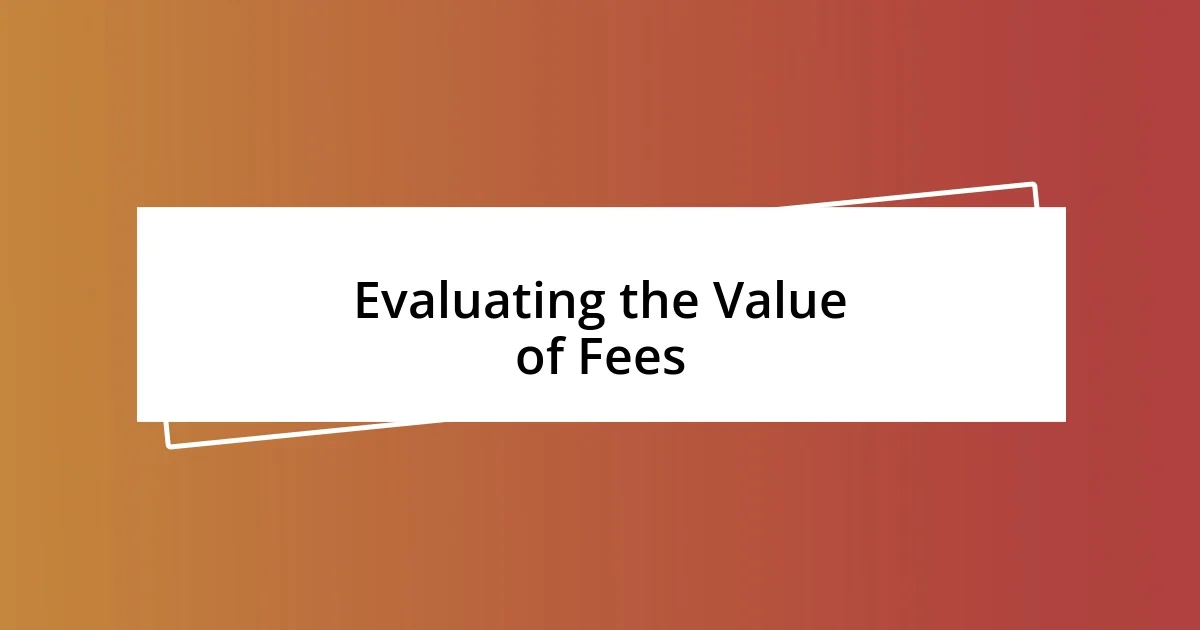
Evaluating the Value of Fees
Evaluating fees is an art of discernment that can unlock the true value of our financial choices. When I first scrutinized the monthly charges on my bank statement, a wave of confusion washed over me. It was like looking through a foggy window—everything was muddled. But once I committed to understanding the breakdown of fees, I found that some charges were justifiable, while others felt like a pinch in my wallet with no clear reason. How often do we accept these costs blindly without trying to unveil their stories?
What truly struck me was realizing that not every expense is a needless burden; some are investments in services that genuinely enhance our lives. For instance, I’ve had accounts that charge a nominal fee but offer an array of features that ultimately save me time and effort. In moments like these, it becomes vital to weigh the pros and cons. Is the convenience worth the cost, or is it simply an expense without merit?
In my experience, reflecting on past fees often leads to enlightening discoveries. I recall an instance where I canceled a subscription service, thinking I would save money. Yet, as I looked back, I realized the benefits I had gained far outweighed the fee. Have you measured the value of the services you pay for? An evaluative approach can transform how we perceive expenses, turning them into insights for better spending decisions.

Personal Insights on Fee Management
Personal Insights on Fee Management
I’ve always found fee management to be deeply personal, and I’ve learned that it often requires a mindset shift. There was a time when I was adamant about avoiding any service that charged fees—my instinct was to resist at all costs. However, I’ve come to appreciate that certain fees can bring forth significant value. For instance, a subscription fee for a financial app helped me gain a grip on my budgeting—something I realized was well worth the cost after seeing my savings grow over time. Have you ever considered that spending money might actually set you up for future success?
Sometimes, my emotions around fees can lead me to impulse decisions. I remember a particularly challenging month; I panicked and closed an investment account solely to avoid an annual fee. That knee-jerk reaction cost me potential growth in my portfolio that I regret to this day. Reflecting on that experience taught me that it’s not just about the immediate expenses but also about the long-term benefits—or consequences—of my choices. Have you ever acted on impulse in your financial journey?
I’ve found that frequent check-ins on my expenses can uncover both hidden fees and unexpected opportunities for savings. For example, during one of these assessments, I discovered an old gym membership that charged a monthly fee. I had completely forgotten about it! Canceling it was an easy choice, but it also made me realize the importance of regular financial audits. How often do you check in on the fees you’re paying? A little vigilance can not only save money but also offer clarity and control over your financial landscape.












